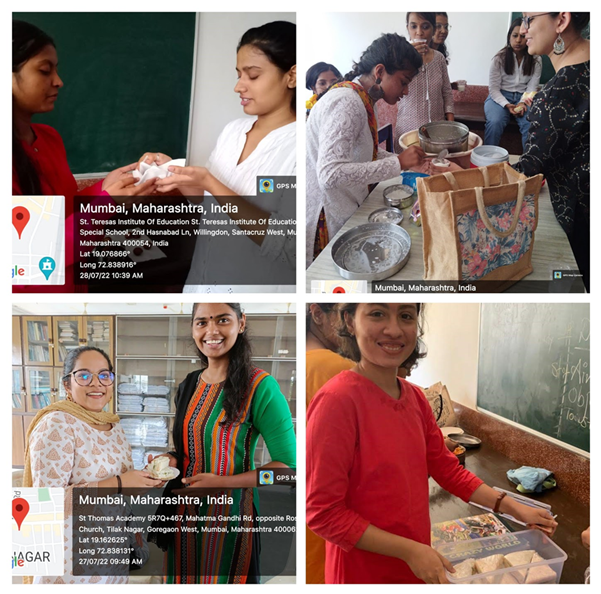
On 13th April 2022, the Annapurna Yojana (APY) Project commenced. It took place in St. Teresa’s Institute of Education, S. V. Road, Santa Cruz (West), Mumbai 400054 and was guided by our professor and coordinator Dr. Reshma Rodrigues. The Organising Committee was St. Teresa’s Institute of Education itself. The project members were as follows: Ms. Amrita Nakhwa, Ms. Lourdes Sheejo Kottakali, Ms. Krisha Maniar, Ms. Binaisha Fernandes, Ms. Rachel D'souza, Ms. Sneha Vijayan and Ms. Mrunal Mirajkar. These members were responsible for carrying out the project. 50 F.Y. B.Ed. students and the staff of St. Teresa’s Institute of Education participated in the project. The project lasted till 27th August 2022, which marked the end of the project.
The main objectives of the Annapurna Yojana (APY) Project were to encourage students to gain experience in the field of small-scale business and to increase self-reliance approach. This way the students will have practical knowledge in learning practical business, it is a small step of learning to do business with transactions. The students will also learn how to effectively manage a small-scale business by themselves. The students through this APY project will also learn how to manage their finances effectively while maintaining a small-scale business. A total of 07 F.Y.B. Ed students of St. Teresa’s Institute of Education opted to participate in the Annapurna Yojana (APY) project.
The students had to set up food stalls for a period of 25 working days in the college and sell their items in the college itself during break time. All students and staff were welcome to pay a visit to the stalls. The students had to prepare and bring food items that cost no more than 20 rupees which included profits no more than Rs. 2 per item. The aim was to instill in students the value of managing a business, the steps required and purpose of carrying out business, managing cost price and selling price and how to manage profits or losses.
The students participating in the APY project had to maintain a sales register for tracking their daily expenses, sales and profits or losses. They had to keep a regular track of their stalls and manage it efficiently. At the end of 25 days of sales, they had to prepare a Statement of Accounts and Balance Sheet of their business they carried out through the APY project. Students learnt how to effectively manage a small-scale business and also how to manage their finances. Through this project students have learnt how they need to manage their costs according to the audience and how demand of buying certain goods and selling it takes place. They also have learnt to manage the crowd keeping in mind the sales and how they have to think swiftly on the spot while customers gather around to buy their items. The APY project has also increased their self-reliance approach.

